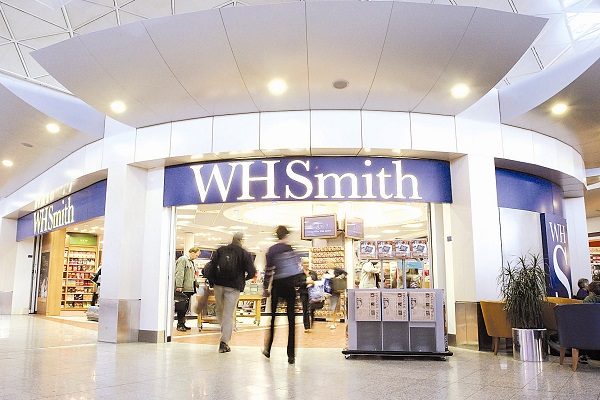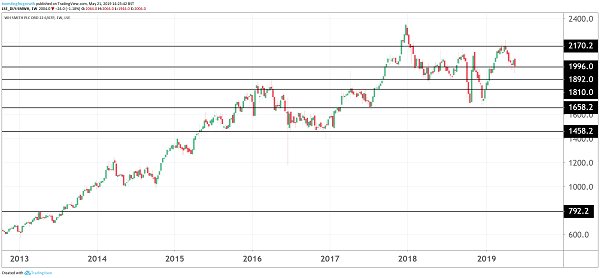What happens to WH Smith shares after CEO leaves?
Chief executive Stephen Clarke is leaving, which has got investors wondering about Smiths' future.
21st May 2019 14:31
by Graeme Evans from interactive investor
Chief executive Stephen Clarke is leaving, which has got investors wondering about Smiths' future.

After boosting shareholder returns by 233% over his six-year tenure, WH Smith (LSE:SMWH) CEO Stephen Clarke more than deserves the luxury of being able to name his own departure date.
In an unforgiving world for bricks-and-mortar retail, Clarke has kept WH Smith growing at a time when other familiar UK names such as Mothercare (LSE:MTC) or Carpetright (LSE:CPR) have struggled.
The announcement today that Clarke plans to "take a break" after a total of 15 years with the company left shares 1% lower, although that's no big sell-off for the loss of a successful leader.
That may be because WH Smith has a ready-made replacement in Carl Cowling, who will take the helm in November after spells running both the high street and travel divisions.
It looks to be more of the same as far as shareholders are concerned, with a continuation of the focus on margins and cash generation from the sale of stationery, sweets and magazines. That was the strategy inherited by Clarke when he took over from Kate Swann in July 2013, allowing Smiths to recently announce £1 billion of dividends and share buybacks since 2007.
From Clarke's first day in charge at 718p, the stock peaked at 2,400p in December 2017 before a more uncertain period fluctuating at around the 2,000p mark in recent months.
Progress towards broker Peel Hunt's 2,550p target is likely to hinge on the success of recent acquisition InMotion. November's addition has the potential to be a game-changer, with the Florida-based business offering a platform for growth into the digital accessories sector.

Source: TradingView Past performance is not a guide to future performance
InMotion has doubled the size of the Smiths business outside of the UK, with the international travel arm now up to 425 units with a presence in 99 airports and 30 countries. In an update alongside today's news on Clarke, WH Smith said the integration of InMotion was progressing well and offered the potential to grow in both the domestic US market and overseas.
Across the travel business, quarterly like-for-like sales were up 3% with gross margins in line with expectations. The division is the powerhouse of the business, with analysts forecasting that the network of stores in railway stations, motorway service areas and airports will eventually account for 75% of the group's sales. Around 20 units are due to open in the UK in the current financial year, including 10 hospital stores.
In the high street business, like-for-like sales were down 1% in the 11 weeks to May 18 but this was offset by continued improvement in gross margins.
UBS described the third quarter update as solid, although the broker still has a "sell" recommendation and price target of 1,675p. It noted the heightened risk posed by weaker-than-expected UK passenger numbers this summer.
Analyst Andrew Hughes added: "As per the last CEO change six years ago, we do not expect any change to strategy. The main focus will be on additional value creation in the United States."
The measured reaction to Clarke's departure contrasts sharply with the share price movement at Scapa (SCPA), where highly-regarded CEO Heejae Chae is stepping down after 10 years with the healthcare and industrial company.
His value to the adhesives specialist was highlighted in today's annual results showing record revenues of more than £300 million and a trading profit up 10.7%. The final dividend rose by a fifth to 2.9p a share. With a successor still to be found, shares slid 11% to 329p.
Chae, who plans to stay until the handover to a new CEO, said it was the right time to bring new leadership to deliver the next phase of Manchester-based Scapa's strategy:
"I have been with the company through many chapters of its growth, from a predominantly industrial business to a significant sized international company now predominantly healthcare focused."
These articles are provided for information purposes only. Occasionally, an opinion about whether to buy or sell a specific investment may be provided by third parties. The content is not intended to be a personal recommendation to buy or sell any financial instrument or product, or to adopt any investment strategy as it is not provided based on an assessment of your investing knowledge and experience, your financial situation or your investment objectives. The value of your investments, and the income derived from them, may go down as well as up. You may not get back all the money that you invest. The investments referred to in this article may not be suitable for all investors, and if in doubt, an investor should seek advice from a qualified investment adviser.
Full performance can be found on the company or index summary page on the interactive investor website. Simply click on the company's or index name highlighted in the article.